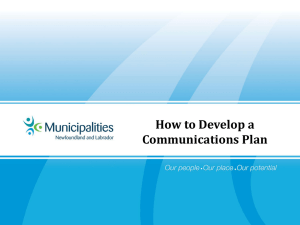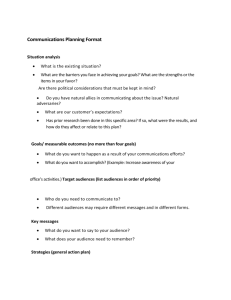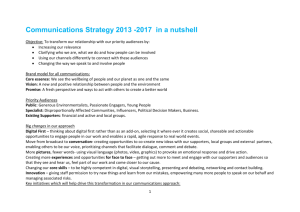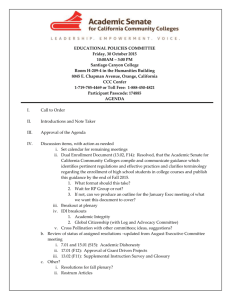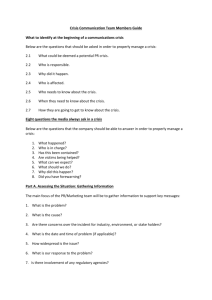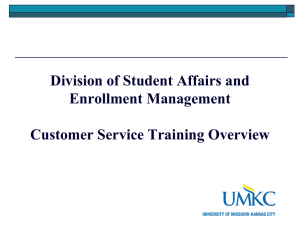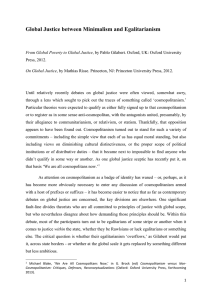SRECA Executive Summary application/vnd
advertisement
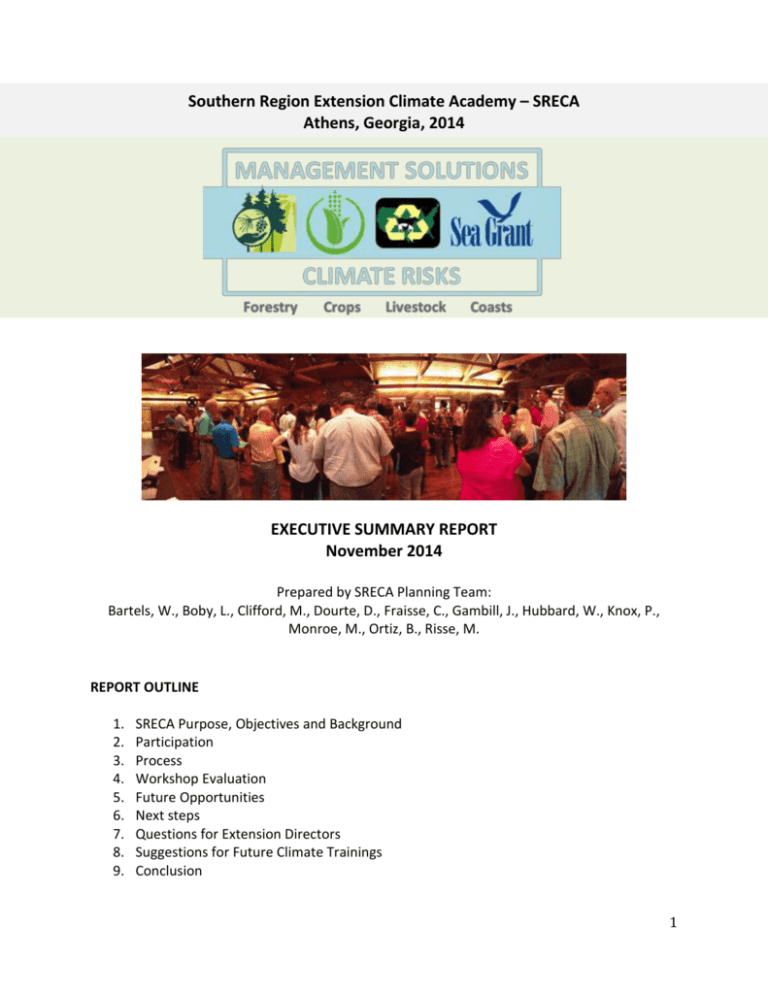
Southern Region Extension Climate Academy – SRECA Athens, Georgia, 2014 EXECUTIVE SUMMARY REPORT November 2014 Prepared by SRECA Planning Team: Bartels, W., Boby, L., Clifford, M., Dourte, D., Fraisse, C., Gambill, J., Hubbard, W., Knox, P., Monroe, M., Ortiz, B., Risse, M. REPORT OUTLINE 1. 2. 3. 4. 5. 6. 7. 8. 9. SRECA Purpose, Objectives and Background Participation Process Workshop Evaluation Future Opportunities Next steps Questions for Extension Directors Suggestions for Future Climate Trainings Conclusion 1 1. SRECA PURPOSE, OBJECTIVES & BACKGROUND Extension agents in the Southeast hold perceptions about climate change that range from very concerned about anthropogenic climate change to not at all concerned and unconvinced that climate change is occurring. These perspectives mirror those of the general public throughout the United States. Even those agents who wish to conduct programs about climate change are concerned that their audiences might lose trust in Extension because of varying beliefs and the association of climate change with political positions. Agriculture and natural resource Extension leaders see the issue of climate change as an important topic for professional development for agents across the region. The motivation for SRECA emerged in August 2012, when the Southern Region Extension Directors asked Dr. Joan Dusky (University of Florida), Associate Dean for Extension-Agricultural Program, to coordinate a regional professional development program for agents on the subject of climate change. Dr. Dusky approached the leadership of three USDA-NIFA-funded regional climate projects to undertake this task. A 12-member planning task force was created (see Appendix A for a list of the members and their affiliated NIFA project). After extensive planning and scoping, the task force designed and facilitated a three-day program that was designed to: Support Extension professionals in the application of climate science and stakeholder engagement methods for developing place-based adaptation and mitigation options that support more resilient forest, crop, livestock, and coastal systems in the Southeastern USA; and Build an alumni network of innovative leaders in Extension who are knowledgeable on key climate science basics, skilled in stakeholder engagement strategies, capable of being state or local resources, and can share ideas with others regionally through exchanging innovative program ideas and outreach materials. Each State Extension Director was invited to select up to 16 Extension professionals (county agents and specialists) to attend the program. Extension professionals gathered at a regionwide in-service training in Athens, Georgia from September 3rd to 5th, 2014. This training academy was designed to be a starting point for Extension professionals to learn climate science and change issues and network with colleagues across the region. In addition, the training was designed to explore how their programming might be modified to include information about management strategies in the face of emerging threats from a changing climate. 2. PARTICIPATION A total number of 122 participants from 15 states attended the SRECA training. Figures 1 and 2 provide a breakdown of participants by state and sector. 2 Fig. 1. Fifteen states were represented at the event. Fig. 2 Number of Crops, Forestry, Livestock, and Coast participants 3. PROCESS The SRECA workshop was a combination of lectures, interactive breakout sessions, and discussions. Plenary presentations focused on the latest climate science, tool and decision support resources, as well as communication strategies for stakeholder engagement. Breakout sessions for in-depth discussions around climate issues related to coastal resources, forestry, livestock and crops. These breakout sessions were an opportunity for agents and specialists in each sector to learn about and discuss sector-specific aspects of managing for a changing climate. Finally, shared meals and breaks were an opportunity for informal networking and community building. Table 1 shows plenary sessions; table 2 lists sector discussion themes. Table 1. Plenary Sessions at SRECA Workshop “Icebreaker” – Wendy-Lin Bartels “Who Are We” – Maggie Clifford “Prehistoric, Contemporary, or Futuristic: To the “Hydroclimate” It’s All the Same or Is It?” - Marshall Shepherd “Climate 101” – Pam Knox “USDA Southeast Regional Climate Hub (SERCH)” – Steve McNulty “Climate Information and Decision Support Systems : AgroClimate” – Clyde Fraise “PINEMAP DSS” – Heather Aldridge “Understanding Audiences and Processes” – Martha Monroe & Wendy-Lin Bartels “Reviewing Needs, Working Together” – Mark Risse 3 Table 2. Sector Sessions at SRECA Workshop Sector specific climate impacts, case studies and discussion: What are the needs for Extension programs? Explore management options with specific adaptations for more resilient and efficient systems. Explore communication strategies for sharing more resilient and efficient management strategies. Discuss and plan program opportunities to meet needs 4. WORKSHOP EVALUATION “I was not excited about the subject matter prior to the workshop…it was better than I expected. I am now more open to discussing climate change.” - SRECA participant 4.1 What participants liked and what they didn’t Figure 3 shows the results of participants’ ratings regarding their perceptions of the value of the plenary sessions. The highest valued presentations were Marshall Shepherd’s lecture on the state of current climate science and Steve McNulty’s presentation on the new USDA Climate Hubs. Sector specific presentations, such as the forestry PINEMAP DSS, had lower ratings. Figure 4 illustrates perceptions about the extent to which SRECA outcomes were accomplished. Networking was ranked highly as an accomplished outcome while identifying specific management outcomes and program plans were not. Fig. 3 Participants’ rating of workshop plenary sessions 4 Fig 4. Outcome Evaluation 4.2 What changed: Pre/post comparison graph of climate perceptions Although the SRECA workshop did not expressly focus on the causes of climate change, Figure 5 shows that perceptions of climate change causes shifted after the event. Respondents who answered that “climate change is occurring but we don’t know its cause” and that there is “insufficient evidence to know with certainty whether climate change is occurring” decreased from 22% to less than 7% of the group. Figure 5. Changes in perceptions about the causes of climate change 5 5. FUTURE OPPORTUNITIES Participants developed ideas for Extension resources and communication strategies in their breakout groups (Coasts, Livestock, Forests, Crops). Numerous possibilities for training resources and communication strategies related to climate-resilience and resource efficiency emerged and a summary of these ideas is available on the SRECA blog (http://srecablog.wordpress.com/). This list of ideas could guide potential future programming emphasis. 6. NEXT STEPS At this meeting, Extension agents worked together, discussed climate programs, and provided input about next steps. For the program to have a long-term impact, it is critical to keep these conversations going. Therefore, the most important follow-up task relates to establishing mechanisms that will facilitate on-going communication among Academy participants. Four leaders within the planning team have taken initial steps to keep up momentum by creating different sector group listservs. The leaders have emailed participants to provide early feedback from the Academy and to assess how groups might like to move forward together. Relevant content is located on the SRECA Blog (http://srecablog.wordpress.com), and a short video of the SRECA workshop is available here ( http://youtu.be/7GUXjD6z9Lc). Depending on input from the participants, there are several avenues for future interaction within the four sectors such as: A set of webinars providing more locally specific climate projections for the Southeast and exploring how these projections are likely to impact Extension audiences. We would help agents understand the risks and adaptation possibilities that will help farmers and other landowners manage their resources; Transforming the current website to a dynamic platform where agents can exchange articles and presentations they create, and discuss what they learn and experience as they work on climate-related projects; 6 Information about presenting climate information that enables agents to gain confidence in their own abilities to begin conversations with audiences. 7. QUESTIONS FOR EXTENSION DIRECTORS Directors across the region can assist the Academy planning team in taking the next steps by engaging their participating agents and specialists in discussions about what they think would be the most effective way to meet their needs. You might consider asking: How can regional resources assist you with climate-related programming? To what extent do your audiences understand how current climate change might impact their livelihoods? What is Extension’s role in supporting growers, managers, and planners as they experiment, test, and learn together? How well are your university’s researchers communicating with your Extension agents about locally relevant solutions for climate adaptations? 8. SUGGESTIONS FOR OTHERS INTERESTED IN DEVELOPING CLIMATE TRAINING PROGRAMS Other regions of the country and other sectors within Extension have been interested in the work we have conducted. Some are planning similar efforts. This planning team would like to offer the following suggestions based on this experience: Conduct a needs assessment with your potential audience and use that in your planning. The needs assessment might include example questions on current knowledge and interest levels, current demand and capacity abilities, specific topic area questions and a variety of other inquiries. Include agents in the planning process and find ways for them to present their experiences in ways that do not alienate others who have less experience or intent. Allow participants to choose the level at which they want to learn—about climate and climate communications. Develop formats such as concurrent sessions to meet these needs. Provide solid information about climate, climate change, and tools for understanding climate and risks. Help agents translate climate information to management risks and adaptation solutions—what do these projections mean to audiences and what should they do? Allow participants to interact with and work in their sector group (horticulture, forest, community, range, crops, coastal, etc.), especially on risks and tools that are content specific. Be explicit on the goals of the program and what you expect they will do as a result—is this info sharing, knowledge exchange, or program building? 7 9. CONCLUSION SRECA is an ongoing project for which the workshop in Athens was a beginning. Action items mentioned in this report can strengthen networks that were formed there and expand awareness of climate-related topics throughout the region. It will evolve to meet the needs of participants. In addition, the SRECA model may be a replicable format for other Extension regions interested in addressing climate-related issues. There are important lessons to be learned and successes to be shared from this event. As we move forward in a changing climate, our ability to successfully adapt to climate-related challenges depends on our ability to integrate what we know with what we do. Extension agents must be prepared to respond to climate-related questions and be able to share decision support tools so that our farm, forest, and coastal systems can better mitigate risk and adapt to change. SRECA can support Extension agents in this role. APPENDIX A: PLANNING TEAM AND SRECA CONTACTS The Southern Region Extension Climate Academy Planning Team (SRECA) NIFA PROJECT & Website Southeast Climate Extension Crops http://www.agroclimate.org/seclimate/ PINEMAP Forestry http://pinemap.org/ Animal Agriculture and Climate Change Livestock http://animalagclimatechange.org/ Coastal SRECA TEAM Clyde Fraisse Daniel Dourte Wendy-Lin Bartels Brenda Ortiz Martha Monroe Bill Hubbard Leslie Boby Mark Megalos Mark Risse Pam Knox Jill Gambill Mark Risse State FL NC GA GA Contact Info cfraisse@ufl.edu ddourte@ufl.edu wendylin@ufl.edu bortiz@auburn.edu mcmonroe@ufl.edu whubbard@sref.info lboby@sref.info mamegalo@ncsu.edu mrisse@uga.edu pknox@uga.edu GA GA jgambill@uga.edu mrisse@uga.edu AL FL GA 8
